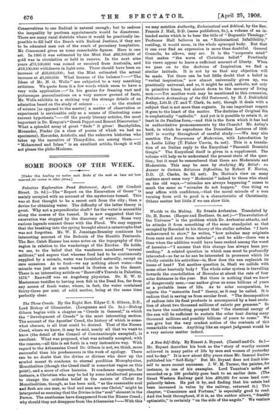The Three Creeds. By the Right Rev. Edgar C. S.
Gibson, D.D., Lord Bishop of Gloucester. (Longmans and Co. 5s.)—Bishop Gibson begins with a chapter on "Creeds in General," in which the "Development of Creeds" is the most interesting section. The account of the Apostles' Creed, the history of which is some- what obscure, is all that could b3 desired. That of the Nicene Creed, where we know, it may be said, nearly all that we want) to know (the detail of the Council of Constantinople excepted), is excellent. What was proposed, what was actually accepted, with the reasons,—all this is set forth in a very instructive way. With regard to the Athanasian Creed Dr. Gibson is not, we think, more successful than his predecessors in the work of apology. There can be no doubt that the divine or divines who drew up the symbol meant tb condemn to eternal perdition Monophysites, Monothelites (though the Creed itself is somewhat vague on this point), and a score of other heresies. It condemns expressly, for instance, a Christian who may be led by some intellectual process to change the orthodox belief in the nature of Christ for Monothelitism, though, as has been said, "as the reasonable soul and flesh are one man, so God and man are one Christ," might be interpreted as meaning that the Divine is the "soul" element in the Person. The anathemas have disappeared from the Nicene Creed ; why should they not disappear from the Athanasian P—With this we may mention Authority, Ecclesiastical and Biblical, by the Rev. Francis J. Hall, D.D. (same publishers, 6s.), a volume of an in- tended series which is to bear the title of " Dogmatic Theology." Professor Hall believes in an "Ecclesiastical Infallibility," residing, it would seem, in the whole episcopal body. But that it can ever find an expression is more than doubtful. General Councils, he allows, may err. It is the "corporate mind" that makes "the norm of Christian belief." Practically his views appear to leave a sufficient amount of liberty. When we pass on to the doctrine of Inspiration we find a similar latitude. It is not by us that any objection will be made. Yet there can be but little doubt that a belief in "verbal inspiration," now almost universally given up, was practically universal, and so, it might be said, catholic, not only in primitive times, but almost down to the memory of living men.—Yet another work may be mentioned in this connexion, Prehistoric Archaeology of the Old Testament, by H. J. Dukinfield Astley, Litt.D. (T. and T. Clark, 5s. net), though it deals with a subject that is not more than cognate. In one important respect it goes to the heart of the matter. The doctrine of Original Sin is emphatically "catholic." And yet is it possible to retain it, at least in its Pauline form,—and this is the form which it has had in authoritative pronouncements by the Church? Mr. Astley's book, in which he reproduces the Donnellan Lectures of 1906- 1907 is worthy throughout of careful study.—We may also mention The Programme of Modernism, with Introduction by A. Leslie Lilley (T. Fisher Unwin, 5s. net). This is a transla- tion of an Italian reply to the Encyclical "Pascendi Dominici Gregis." The Encyclical itself is given in a supplement. The volume will help us to understand the present state of the ques- tion; but it must be remembered that there are Modernists and Modernists. This may be seen by studying My Belief : an Answer to Certain Religious Difficulties, by Robert F. Horton, D.D. (J. Clarke, 3s. 6d. net). Dr. Horton's view on many matters must seem very " Modernist " indeed to those who stand on the old ways,—" miracles are always happening" comes to much the same as "miracles do not happen." One thing we may affirm with confidence,—that the moral miracle of a man turning from evil to good is a characteristic of Christianity. Others matter but little if we can show this.






















































 Previous page
Previous page